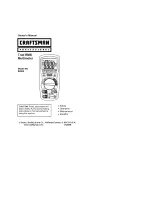
21
- Disconnect the safety measuring leads from the BENNING MM 1-2/ 1-3.
- Switch the rotary switch
8
to position „OFF“.
- Put the BENNING MM 1-2/ 1-3 face down and unscrew the screw of the
battery compartment cover.
- Lift off the battery compartment cover from the bottom part.
- Remove the batteries from the battery compartment.
- Remove the suspension fixture
L
(lift off the snap-on nose by means of a
small slotted screwdriver) from the bottom of the housing.
- Unscrew the four screws from the bottom of the housing.
Do not unscrew any screws from the printed circuit of the
BENNING MM 1‑2/ 1‑3!
- Lift off the bottom of the housing from the front part.
- Lift one end of the defective fuse out of the fuse holder.
- Completely remove the defective fuse from the fuse holder.
- Insert a new fuse of the same nominal current, of the same triggering char-
acteristics and of the same dimensions.
- Arrange the new fuse in the middle of the holder.
- Carefully place the bottom of the housing back onto the device. When
closing the bottom of the housing, make sure that the battery springs in the
bottom of the housing slide into the receptacle slots!
- Lock the bottom of the housing into place onto the front part and fasten the
four screws.
- Lock the suspension fixture
L
into place on the back of the bottom part of
the housing.
- Insert the batteries back into the battery compartment observing correct po-
larity, close the battery compartment cover and tighten the screws.
See figure 14:
Fuse replacement
9.5 Calibration
To maintain accuracy of the measuring results, the device must be recalibrated
in regular intervals by our factory service. We recommend recalibrating the de-
vice once a year. For this purpose, send the device to the following address:
Benning Elektrotechnik & Elektronik GmbH & Co. KG
Service Center
Robert-Bosch-Str. 20
D - 46397 Bocholt
9.6 Spare parts
Fuse F 10 A, 600 V, 50 kA (Bussmann KTK or DCM) part no. 748263
10. Using the suspension fixture
- You can store the safety measuring leads by winding them around the de-
vice and by engaging the probe tips of the safety measuring leads in a pro-
tected way on the suspension fixture
L
(see figure 15).
- You can engage a safety measuring lead on the suspension fixture
L
in such a way that the probe Tipp remains free in order to be able
to guide the probe tip towards a measuring point together with the
BENNING MM 1-1/ 1-2/ 1-3.
-
The rear support of the device allows an incleadd setup of the
BENNING MM 1-1/ 1-2/ 1-3 (facilitates reading the measured values) or
suspension of the device (see figure 16).
- The suspension fixture
L
is equipped with a lug which can be used for
suspension.
See figure 15:
Winding up the safety measuring leads
See figure 16:
Erecting the BENNING MM 1-1/ 1-2/ 1-3
11. Technical data of the measuring accessories
- Standard: EN 61010-031,
- Maximum rated voltage to earth (
) and measuring category:
With push-on caps: 1000 V CAT III, 600 V CAT IV,
Without push-on caps: 1000 V CAT II,
- Maximum rated current: 10 A,
- Protection class II (
), continuous double or reinforced insulation,
- Contamination class: 2,
- Length: 1.4 m, AWG 18,
-
Ambient conditions:
Barometric height for measurements: max. 2000 m,
Temperature: 0°C to + 50 °C, humidity: 50 % to 80 %
- Use the measuring leads in perfect and clean condition as well as according
to these operating instructions only, as otherwise the protection provided
02/ 2011
BENNING MM 1-1/ 1-2/ 1-3
















































